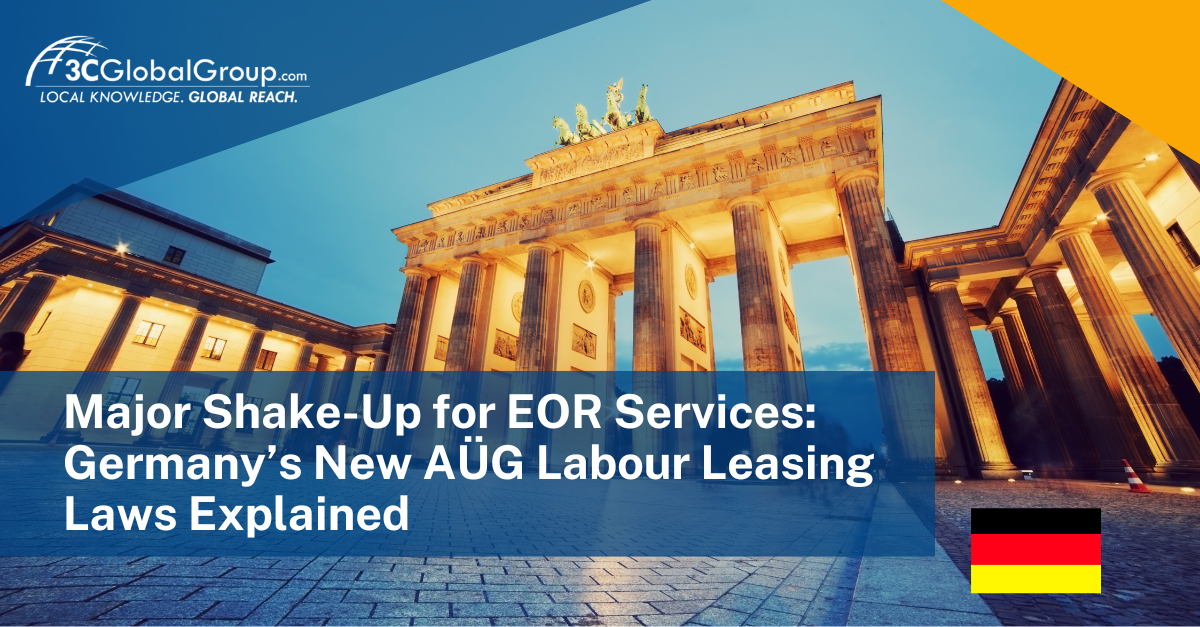
Engaging international contract professionals can offer a business numerous advantages, including expanding and diversifying its skills profile, fulfilling temporary project needs, addressing skill shortages, and growing/establishing a presence in a foreign market. Germany can be a very attractive for organisations to hire in due to its economic power, location in Europe, educated workforce and vibrant industries. However, hiring international workers in Germany presents distinct challenges, particularly in navigating the country's intricate labour laws.
Two distinct solutions exist for those looking to hire international workers in Germany. These solutions include the Employer of Record (EOR) solution and an employed solution, Germany's Labour leasing licence, also known as Arbeitnehmerüberlassungsgesetz often (abbreviated ANÜ or AÜG). However, recent updates to the interpretations of Germany's AÜG may have implications for EOR services and the businesses using them. These amendments, which were introduced by the German Federal Employment Agency (Bundesagentur für Arbeit) in October 2024, introduce some key changes to the AÜG labour leasing guidelines. In this article, we will examine what changes the new update is introducing, why these changes are being made and how this impacts organisations hiring in Germany.
What's changing under the updated German Labour Leasing Act?
The revised AÜG introduces a broader scope for compliance and tightens the requirements for engaging contract professionals. Under the latest update to Germany's Labour Leasing Act or Arbeitnehmerüberlassungsgesetz, remote workers hired in a digital role by a German organisation are now included in the country's updated AÜG guidelines. In the past, the AÜG criteria required workers hired under this model to be physically based in Germany. Under the new changes to the AÜG, German organisations will be required to verify that their EOR provider possesses an AÜG licence to hire international talent based outside of Germany compliantly.
Why are the AÜG guidelines changing?
With global employment trends highlighting the upward trend of remote work and organisations hiring international remote talent, Germany's German Federal Employment Agency has identified the need for increased regulation to protect workers and prevent abuses in the country's labour market. Germany joins some of their European counterparts in implementing more stringent guidelines to promote workers' fair treatment.
Implications for recruiters and organisations:
The recent changes to Germany's Labour Leasing Act or Arbeitnehmerüberlassungsgesetz create new layers of complexity for recruiters and businesses managing international contract workers. Organisations must adopt rigorous due diligence processes when selecting EOR or labour leasing partners and be aware of the changes affecting them and their clients and employees to maintain compliance and safeguard their operations in Germany from the penalties and risks of non-compliance. Understanding local labour laws and ensuring adherence to equal treatment principles are now more critical than ever. When deciding on an EOR/employment services provider, businesses and recruitment agencies should first:
- Verify an EOR service provider's licensing status.
- Ensure one's EOR partner has a positive compliance track record.
- Understand the risks and penalties associated with non-compliance
- Keep up-to-date with changes to employment regulations in the country where they operate/engage workers.
Verifying licensing status, understanding local labour laws, and ensuring adherence to equal treatment principles are now more critical than ever to ensure compliance and avoid the risks and penalties of non-compliance.
How 3C Global can help:
At 3C Global, we understand that navigating Germany's complex regulatory environment can be daunting. With years of expertise in global compliance, we provide comprehensive solutions tailored to your organisation's unique needs. Here's how we stand out:
- Dual expertise in EOR and AÜG: At 3C Global, we are expert providers of both AÜG and EOR solutions in Germany. This dual expertise allows us to tailor our services based on your specific operational requirements and compliance needs.
- In-depth local knowledge: Our team demonstrates an in-depth understanding of German labour laws and the nuances of the updated Labour Leasing Act. We ensure our team is up-to-date with regulatory changes to help you navigate compliance seamlessly.
- End-to-end support: From drafting compliant employment contracts to managing payroll and supporting your HR needs, we handle multiple aspects of workforce management. We aim to let you focus on your business while ensuring your organisation is fully compliant.
How to navigate these updates:
The updates to Germany's Employee Leasing Act reflect a global trend toward increased virtual and cross-border employment regulation. As the prevalence of remote digital work grows, organisations must adapt to evolving compliance requirements while staying competitive in the international talent market.
Your compliance partner:
At 3C Global, we're here to simplify the complexities of global workforce management. Our tailored solutions are designed to help you confidently navigate regulatory landscapes and secure international talent while staying compliant. Whether you need guidance on what solution best suits your needs or support in managing international contract professionals, our team of experts is on hand to assist.
Safeguard your operations from the risks and penalties of misclassification and non-compliance. Call our knowledgeable team at 3C Global for expert advice, start your review, and ensure your agency meets the new compliance criteria for 2025!
Unlock the full potential of your international workforce with 3C Global today!
Want to see more content like this? Sign up for our newsletter for the latest industry insights and company news.


